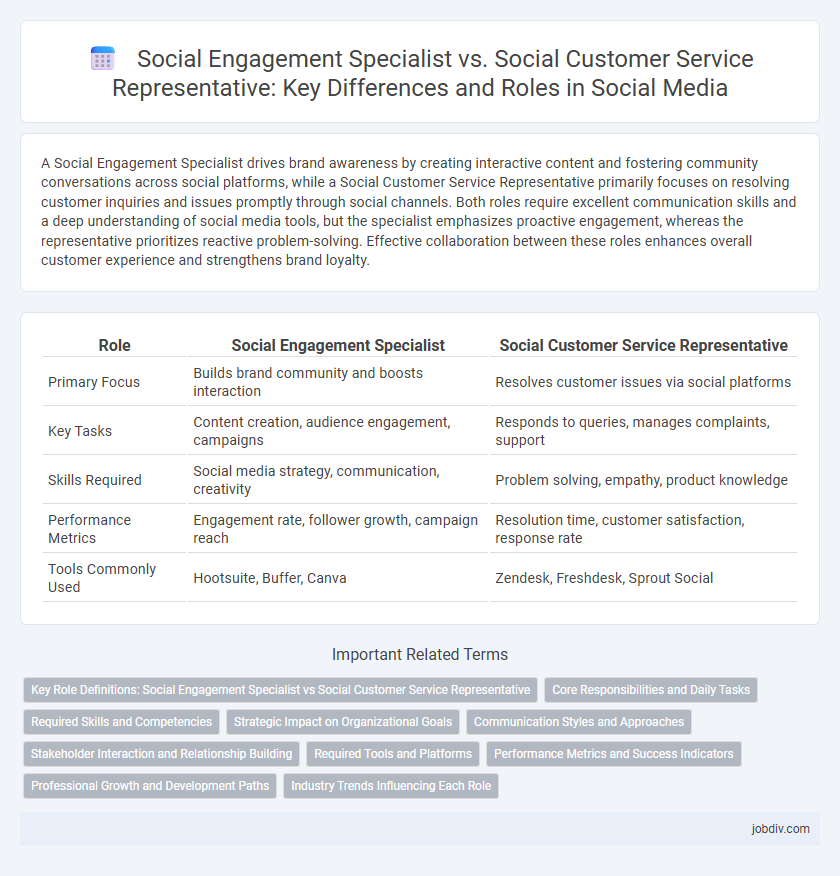A Social Engagement Specialist drives brand awareness by creating interactive content and fostering community conversations across social platforms, while a Social Customer Service Representative primarily focuses on resolving customer inquiries and issues promptly through social channels. Both roles require excellent communication skills and a deep understanding of social media tools, but the specialist emphasizes proactive engagement, whereas the representative prioritizes reactive problem-solving. Effective collaboration between these roles enhances overall customer experience and strengthens brand loyalty.
Table of Comparison
| Role | Social Engagement Specialist | Social Customer Service Representative |
|---|---|---|
| Primary Focus | Builds brand community and boosts interaction | Resolves customer issues via social platforms |
| Key Tasks | Content creation, audience engagement, campaigns | Responds to queries, manages complaints, support |
| Skills Required | Social media strategy, communication, creativity | Problem solving, empathy, product knowledge |
| Performance Metrics | Engagement rate, follower growth, campaign reach | Resolution time, customer satisfaction, response rate |
| Tools Commonly Used | Hootsuite, Buffer, Canva | Zendesk, Freshdesk, Sprout Social |
Key Role Definitions: Social Engagement Specialist vs Social Customer Service Representative
A Social Engagement Specialist focuses on building brand awareness and fostering community interaction across social media platforms by creating engaging content and managing conversations to boost user participation. In contrast, a Social Customer Service Representative handles customer inquiries, resolves complaints, and provides support through social channels, emphasizing problem-solving and timely response. Both roles require strong communication skills, but the specialist prioritizes proactive engagement while the representative concentrates on reactive customer assistance.
Core Responsibilities and Daily Tasks
Social Engagement Specialists focus on building and maintaining online community relationships by creating content, analyzing audience insights, and driving interactive campaigns to boost brand presence. Social Customer Service Representatives handle customer inquiries, resolve complaints, and provide real-time support through social media platforms, ensuring customer satisfaction and retention. Both roles require strong communication skills, but Engagement Specialists prioritize brand interaction while Customer Service Representatives emphasize issue resolution.
Required Skills and Competencies
A Social Engagement Specialist requires strong skills in community management, content creation, and data analytics to effectively drive user interaction and brand awareness on social platforms. In contrast, a Social Customer Service Representative focuses on empathy, problem-solving, and timely response handling to resolve customer inquiries and maintain satisfaction through social channels. Both roles demand proficiency in social media tools, communication skills, and the ability to adapt messaging to diverse audiences.
Strategic Impact on Organizational Goals
A Social Engagement Specialist drives brand awareness and audience growth through targeted content strategies and community interaction, directly contributing to long-term organizational goals such as market positioning and customer loyalty. In contrast, a Social Customer Service Representative focuses on resolving customer issues and enhancing satisfaction, which supports short-term operational goals like retention and service efficiency. Both roles strategically impact organizational success by aligning customer interactions with overarching business objectives.
Communication Styles and Approaches
Social Engagement Specialists utilize proactive communication strategies, fostering community interaction through personalized content and active dialogue across multiple platforms. Social Customer Service Representatives prioritize reactive communication, addressing individual customer inquiries and resolving issues with empathy and clarity. The Specialist builds brand loyalty through engagement and relationship-building, while the Representative focuses on immediate problem-solving and maintaining customer satisfaction.
Stakeholder Interaction and Relationship Building
A Social Engagement Specialist focuses on building long-term relationships with stakeholders by creating personalized content and fostering community interactions to enhance brand loyalty. In contrast, a Social Customer Service Representative primarily handles direct, real-time issue resolution and customer inquiries to maintain satisfaction and trust. Both roles require strong communication skills, but the Specialist emphasizes proactive engagement while the Representative prioritizes responsive support.
Required Tools and Platforms
Social Engagement Specialists primarily utilize social media management platforms like Hootsuite, Sprout Social, and Buffer to monitor audience interactions, schedule content, and analyze engagement metrics. Social Customer Service Representatives rely heavily on customer support tools such as Zendesk, Freshdesk, and Salesforce Service Cloud to manage inquiries, track tickets, and resolve issues efficiently. Both roles require proficiency in communication platforms like Facebook Messenger, Twitter, and Instagram, but the former emphasizes content engagement tools while the latter focuses on integrated helpdesk systems.
Performance Metrics and Success Indicators
Social Engagement Specialists primarily track engagement rates, content shareability, and audience sentiment to measure campaign impact and brand loyalty. Social Customer Service Representatives focus on response time, resolution rate, and customer satisfaction scores to evaluate support effectiveness and improve user experience. Both roles use data-driven insights but apply distinct performance metrics tailored to either community growth or client support outcomes.
Professional Growth and Development Paths
Social Engagement Specialists typically advance by mastering community management, content strategy, and influencer partnerships, enabling roles in social media marketing leadership or digital communications strategy. Social Customer Service Representatives develop expertise in client relations, conflict resolution, and CRM technologies, paving the way for positions in customer experience management or operational leadership. Both paths offer distinct professional growth opportunities, with specialists focusing on brand presence and representatives on customer satisfaction metrics.
Industry Trends Influencing Each Role
Industry trends shaping the Social Engagement Specialist role include the rise of AI-driven analytics and personalized content strategies, enabling deeper customer interaction and brand loyalty. In contrast, Social Customer Service Representatives are increasingly impacted by the integration of omnichannel support platforms and real-time issue resolution tools, streamlining customer service efficiency. Both roles adapt to the growing demand for instant, authentic digital communication in sectors such as retail, technology, and telecommunications.
Social Engagement Specialist vs Social Customer Service Representative Infographic

 jobdiv.com
jobdiv.com